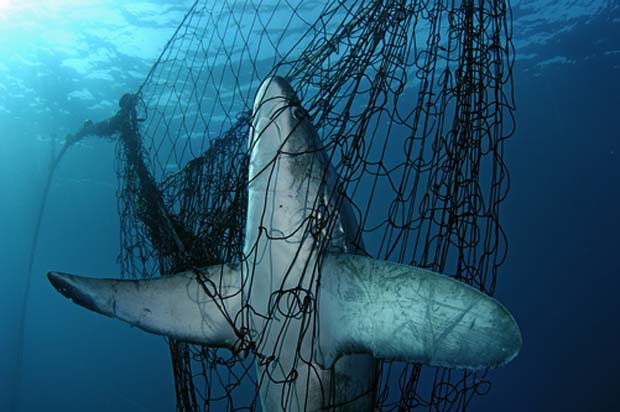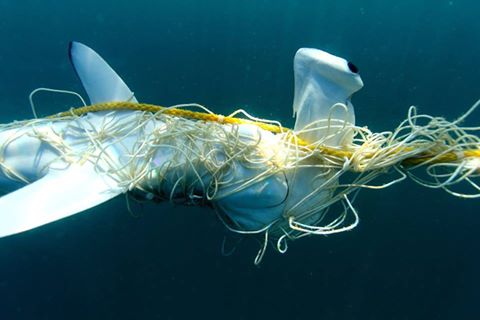Hundreds of Sharks and Rays Entangled in Plastic Debris, Study Finds
ENVIRONMENT, ANIMAL RIGHTS - VEGETARIANISM, 8 Jul 2019
Jordan Davidson | EcoWatch – TRANSCEND Media Service
5 Jul 2019 – More than a thousand sharks and rays have become entangled in jettisoned fishing gear and plastic debris, a new study has found. The researchers behind the study warn that the plastic trapping the sharks and rays may cause starvation and suffocation.
The research, published in Endangered Species Research by scientists at the University of Exeter, sought to bring light to a problem that is a major animal welfare concern, but has slipped under the radar compared to larger threats like commercial fishing, as a press release published by Science Daily reported. The entanglement causes tremendous suffering in animals that survive it.
“One example in the study is a shortfin mako shark with fishing rope wrapped tightly around it,” said Kristian Parton, of the Centre for Ecology and Conservation on Exeter’s Penryn Campus in Cornwall, as Science Daily reported.
“The shark had clearly continued growing after becoming entangled, so the rope — which was covered in barnacles — had dug into its skin and damaged its spine.”
Most of the entanglements, 74 percent, were due to discarded or lost fishing gear. There were also cases of marine life caught in packing straps, bags and clothing.
In their research, the scientists pinpointed 1,116 sharks and rays caught in plastic. Yet, they suggest the true number could be higher, especially since examples of certain entangled species, like the whale shark, only existed on social media and not in published studies.
That discrepancy set the researchers on the course of a novel methodology. To understand the scale of the problem, they looked at published reports since 1940 and also looked at reports on Twitter since 2009.
“Our study was the first to use Twitter to gather such data, and our results from the social media site revealed entanglements of species — and in places — not recorded in the academic papers,” said Brendan Godley, a co-author on the study, as Science Daily reported.
The review of academic papers revealed 557 sharks and rays entangled in plastic, spanning 34 species. An almost equal number were found on Twitter — 559 individual sharks and rays from 26 species including whale sharks, great whites and tiger sharks.
The disparity between Twitter and academic research “emphasizes that entanglement is more than likely impacting a significantly greater number of species on a vastly larger scale than this review has presented,” the researchers said, as Sky News reported.
While the researchers readily admit that entanglement is a far lesser threat than overfishing and warming oceans, they do believe that entanglement should be addressed.
“Entanglement can lead to starvation, suffocation, immobilization and ultimately death, making this unequivocally an animal welfare issue, if not of conservation relevance,” they wrote, as Sky News reported.
Ocean Plastic Projected to Triple Within Seven Years https://t.co/o2zvabE34C @savingoceans @PlasticPollutes
— EcoWatch (@EcoWatch) March 22, 2018
____________________________________________
Related Articles:
- A Whale Shark Cooperates with the Diver Saving Him – YouTube ›
- Heartbreaking Photos Show What Your Trash Does To Animals … ›
- 5-Feet Shark Caught In Plastic, Almost Chokes To Death Off … ›
- 100% of Sea Turtles in Global Study Found With Plastics in Their … ›
Tags: Animal cruelty, Animal rights, Environment, Oceans, Plastic Pollution, Violence, World
DISCLAIMER: The statements, views and opinions expressed in pieces republished here are solely those of the authors and do not necessarily represent those of TMS. In accordance with title 17 U.S.C. section 107, this material is distributed without profit to those who have expressed a prior interest in receiving the included information for research and educational purposes. TMS has no affiliation whatsoever with the originator of this article nor is TMS endorsed or sponsored by the originator. “GO TO ORIGINAL” links are provided as a convenience to our readers and allow for verification of authenticity. However, as originating pages are often updated by their originating host sites, the versions posted may not match the versions our readers view when clicking the “GO TO ORIGINAL” links. This site contains copyrighted material the use of which has not always been specifically authorized by the copyright owner. We are making such material available in our efforts to advance understanding of environmental, political, human rights, economic, democracy, scientific, and social justice issues, etc. We believe this constitutes a ‘fair use’ of any such copyrighted material as provided for in section 107 of the US Copyright Law. In accordance with Title 17 U.S.C. Section 107, the material on this site is distributed without profit to those who have expressed a prior interest in receiving the included information for research and educational purposes. For more information go to: http://www.law.cornell.edu/uscode/17/107.shtml. If you wish to use copyrighted material from this site for purposes of your own that go beyond ‘fair use’, you must obtain permission from the copyright owner.
Read more
Click here to go to the current weekly digest or pick another article:
ENVIRONMENT:
- COP30’s Three F-Words: Failure on Fossil Fuels
- Declaration of the Peoples’ Summit Towards COP30
- Plutonium Found at Former San Francisco Naval Shipyard – Navy Faces Cover-Up Claims
ANIMAL RIGHTS - VEGETARIANISM:

